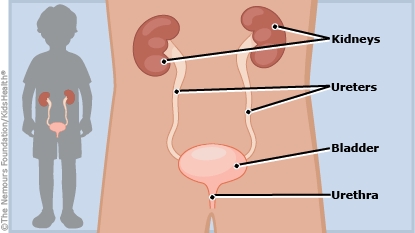Hydronephrosis (hi-dro-nih-FRO-sis) is a swelling of one or both kidneys. It happens when urine (pee) can't drain normally and builds up in the kidney(s). Different things can cause it.
Hydronephrosis doesn't always cause symptoms. When it does, a child might have belly and back pain, blood in the pee, and a higher risk for urinary tract infections (UTIs).
Hydronephrosis is treated by a urologist (urinary tract specialist). Treatment may include just watching to see how your child does, medicines, or sometimes surgery.


Follow your health care provider's instructions for:

Your child:

Your child:

What causes hydronephrosis? In kids, it's usually from one of these:
What problems can happen in hydronephrosis? Sometimes hydronephrosis can lead to kidney damage, but this doesn't usually happen.